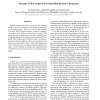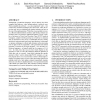268 search results - page 2 / 54 » Experimental Evaluation of Code Properties for WCET Analysis |
ECRTS
2002
IEEE
13 years 9 months ago
2002
IEEE
Most WCET analysis techniques only provide an upper bound on the worst case execution time as a constant value. However, it often appears that the execution time of a piece of cod...
ISORC
2000
IEEE
13 years 9 months ago
2000
IEEE
This paper describes experiences in using an O.O. language (Java) in designing, prototyping and evaluating a CPU manager. QoS Animator facilitates the execution of object oriented...
WORDS
2005
IEEE
13 years 10 months ago
2005
IEEE
Reliable program Worst-Case Execution Time (WCET) estimates are a key component when designing and verifying real-time systems. One way to derive such estimates is by static WCET ...
JTRES
2010
ACM
13 years 5 months ago
2010
ACM
In order to guarantee that real-time systems meet their timing specification, static execution time bounds need to be calculated. Not considering execution time predictability led...
DAC
2009
ACM
14 years 5 months ago
2009
ACM
Traditionally, synchronous languages, such as Esterel, have been compiled into hardware, where timing analysis is relatively easy. When compiled into software ? e.g., into sequent...


